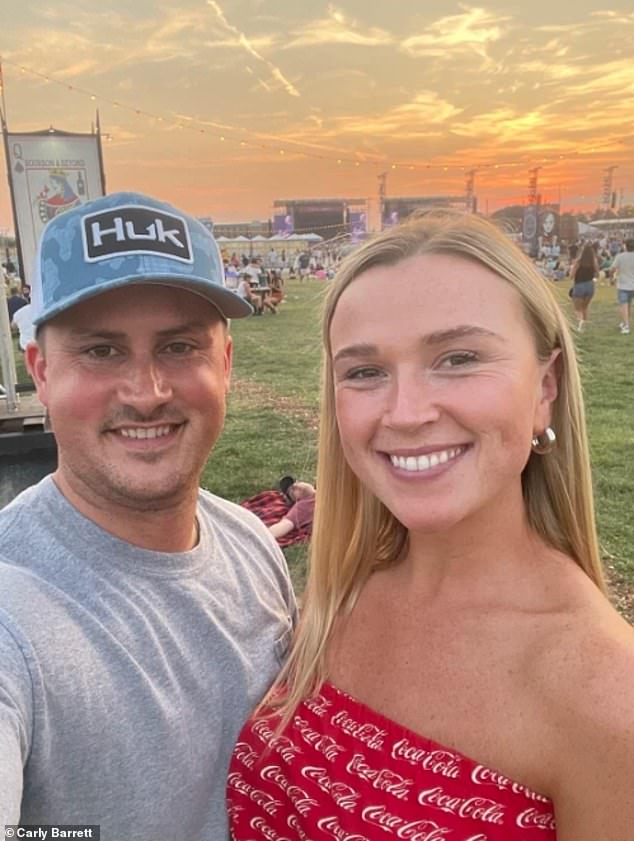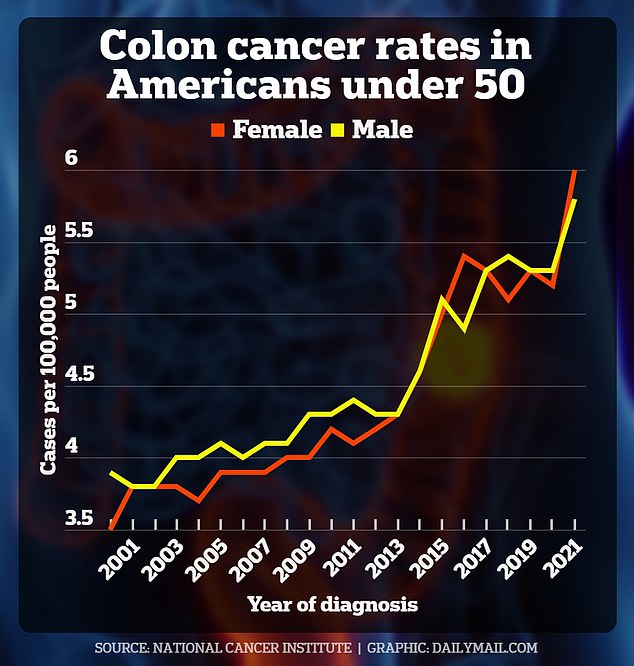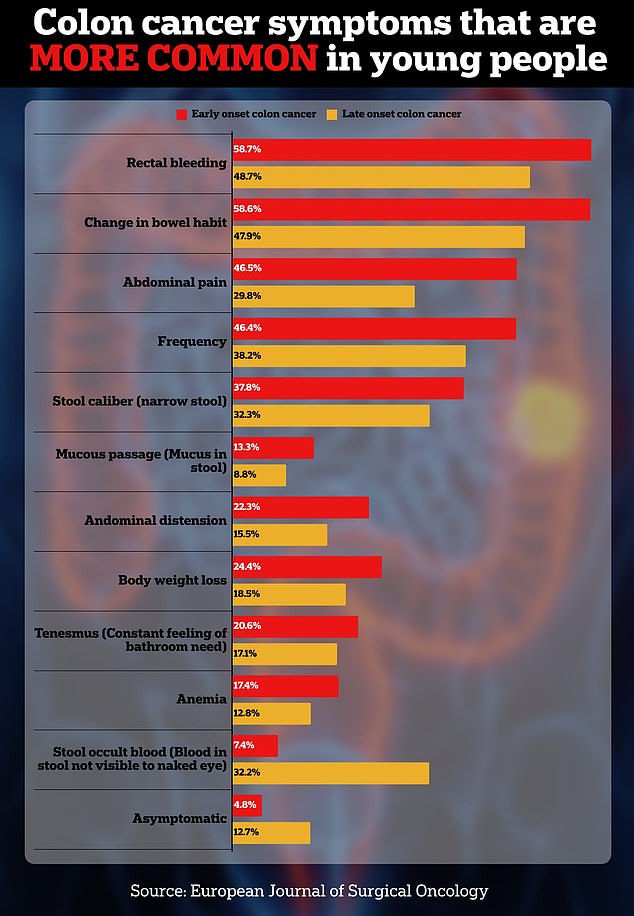Young people with colon cancer appear to suffer slightly different symptoms than typical patients with the disease, according to a new study.
Doctors told DailyMail.com that people under 50 who experience any of the following symptoms should get checked immediately and not wait.
The new research looked at 5,000 people in Taiwan of various ages with colon cancer. Six in 10 under 50s suffered rectal bleeding before being diagnosed with the disease, compared to less than half of those over 50.
And nearly 60 percent of young people with the disease also experienced changes in their health habits before or after diagnosis, compared to 48 percent of older patients.
Dr. Cedrek McFadden, a South Carolina oncologist who was not involved in the study, said the different symptoms between older and younger patients were consistent with what he had seen in his patients.
The above shows the symptoms and their frequency in early-onset patients, who develop colon cancer before the age of 50, and late-onset patients, who develop cancer after this age.

Carly Barrett was diagnosed with colon cancer at age 24 after detecting blood in her stool and suffering abdominal pain. The teacher is from Kentucky.
“It certainly makes sense,” he told DailyMail.com, “rectal bleeding had the strongest association, especially in early onset.”
‘Rectal bleeding tends to be an earlier sign of cancer in them, while abdominal pain is a later sign.
‘Sometimes in younger patients, many of them complain of hemorrhoids, and one of the complaints of hemorrhoids is bleeding.
‘It’s common for younger patients to attribute that bleeding to hemorrhoids and never see a doctor about it, but that allows a potential cancer to grow and become somewhat advanced when it is finally diagnosed.
“That’s why I often tell patients that bleeding, while common, is not normal, and tell them to be evaluated by a doctor.”
The study was led by Taiwan’s Chang Gung Memorial Hospital network, which cares for more than 280,000 patients each year.
In the paper, scientists analyzed data from the hospital database on symptoms reported by patients diagnosed with colon cancer between January 2008 and December 2019.
Patients over 70 were excluded from the analysis because, the researchers said, they were at higher risk of dying from the disease.
Taiwan is also seeing a rise in early-onset colon cancers, meaning Western diets can’t be solely to blame.

Joshua Sanchez, 38, of East Harlem in New York City, mistook his rectal bleeding for hemorrhoids instead of colon cancer. He was diagnosed with stage four (shown above with his mother)
Other theories have suggested that the increase could be related to food additives such as emulsifiers, which are often used in low-fat products, such as low-fat yogurts, to improve texture.
And some scientists have also suggested it could be linked to microplastics or high-fructose corn syrup, a sugar alternative often used in soft drinks.
In the study, doctors analyzed data from 5,704 colon cancer patients, including 1,204 under the age of 50.
It found that rectal bleeding, changes in bowel habits and abdominal pain were more commonly related to younger patients.
Among older patients, rectal bleeding and change in bowel habits were also the two most common symptoms, but were less common than among younger adults.
The third most common symptom for the group was a change in the frequency of needing to go to the bathroom.

The graph above shows the increase in colorectal cancer in Americans under age 50 over the past two decades.
The paper also found an increase in colon cancer among young people, stating that cases had increased three percent annually since 2009 among those under 50 years of age.
Doctors did not suggest a reason why these three symptoms were the most common among early-onset cases, but they did note that these patients tended to be diagnosed at a later date, when the disease was already more advanced.
The study found that 62.4 percent of young people were diagnosed with cancer at stage four or three, compared to 50.3 percent of older adults.
The rising trend of colon cancer cases in Taiwan coincides with the situation in the United States, where the incidence of the disease has increased by 50 percent among people under 50 years of age in the past 30 years.
Rates among people under age 50 have increased about two percent each year since the early 2000s, and the United States now has the sixth highest rate of early-onset colon cancers in the world.
Among patients diagnosed with cancer before turning 50 in the United States was Joshua Sanchez of Harlem, who was told he had cancer at the age of 38.
He had thought his rectal bleeding was due to hemorrhoids, before he was finally diagnosed with stage four cancer.
Meanwhile, teacher Carly Barrett was diagnosed with cancer at age 24, just as she was beginning her career.
The Kentucky native’s cancer was detected after she began noticing blood in her stool and experiencing stomach pain.

